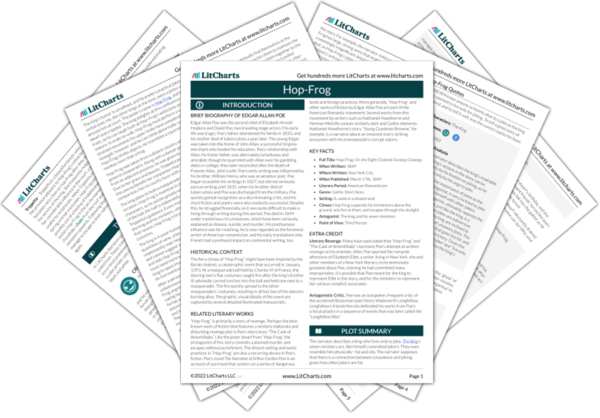In the story, the court jester Hop-Frog manages to get revenge on a sadistic king through elaborate, subversive trickery. Given his role as a jester, Hop-Frog is expected to use humor and hijinks to entertain the court—but as the story progresses, he uses tricks to undermine rather than appease the king. Given the king’s power and influence over his court, trickery is perhaps the only viable way for Hop-Frog and fellow servant Trippetta to retaliate—the king’s soldiers would quickly suppress an open revolt. In this sense, Hop-Frog must plan and execute his scheme very subtly in order for it to succeed: he fools the king and his ministers into wearing costumes he can easily set on fire and then burns the men alive. But this principle also holds true more generally with respect to Hop-Frog’s resistance: even before the jester plots his vengeance, he resists the king’s authority through subtly subversive humor and banter. When Hop-Frog is forced to consume wine for the king’s amusement, for example, he refuses to outwardly demonstrate the effects of the wine, instead acting aloof. Furthermore, he tries to think of a witty response to the king’s cruelty.
In a certain way, then, Hop-Frog’s fiery finale is consistent with his previous subversion. Hop-Frog is aware of this fact, seizing the opportunity to announce at the end of the story that this is his “final jest.” Thus, out of necessity, Hop-Frog has taken the very qualities that the king appreciates in him—jest and trickery—and used them to resist (and defeat) the cruel king. His final act of subversion is his most elaborate, vicious trick. By illustrating this development, the story suggests that humor and trickery aren’t just forms of entertainment. Rather, they’re viable modes of resistance to oppressive powers that can develop into profound forms of subversion and defiance.
Subversion, Jest, and Trickery ThemeTracker

Subversion, Jest, and Trickery Quotes in Hop-Frog
I NEVER knew anyone so keenly alive to a joke as the king was. He seemed to live only for joking. To tell a good story of the joke kind, and to tell it well, was the surest road to his favor.

Unlock explanations and citation info for this and every other Hop-Frog quote.
Plus so much more...
Get LitCharts A+About the refinements, or, as he called them, the 'ghost' of wit, the king troubled himself very little. […] Over-niceties wearied him. He would have preferred Rabelais' 'Gargantua' to the 'Zadig' of Voltaire: and, upon the whole, practical jokes suited his taste far better than verbal ones.
Hop-Frog also laughed although feebly and somewhat vacantly. […]
"I am endeavoring to think of something novel," replied the dwarf, abstractedly, for he was quite bewildered by the wine.”
Hereupon the dwarf laughed (the king was too confirmed a joker to object to any one's laughing), and displayed a set of large, powerful, and very repulsive teeth. Moreover, he avowed his perfect willingness to swallow as much wine as desired.
Soon after this, the king and his seven friends having reeled about the hall in all directions, found themselves, at length, in its centre, and, of course, in immediate contact with the chain. […] The dwarf, who had followed noiselessly at their heels, inciting them to keep up the commotion, took hold of their own chain at the intersection of the two portions which crossed the circle diametrically and at right angles. Here, with the rapidity of thought, he inserted the hook from which the chandelier had been wont to depend[.]
“I now see distinctly” he said, “what manner of people these maskers are. They are a great king and his seven privy-councillors,--a king who does not scruple to strike a defenceless girl and his seven councillors who abet him in the outrage. As for myself, I am simply Hop-Frog, the jester--and this is my last jest.”











